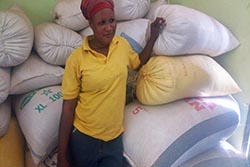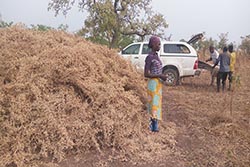Soyabean has become an important crop in northern Ghana over the past decade, where it is grown mainly by smallholder farmers. It is an important source of edible oil and source of high quality protein for both human and livestock. The residues after extracting the oil is an excellent source of high quality protein for the poultry, pig and the fish industries where it is in high demand.
| Availability of market for the grain between 2005 and 2012 encouraged increased production by smallholder farmers in northern Ghana such that area under production increased from 44,545 ha in 2004 (MoFA, 2005) to 85,938 ha in 2011 (MoFA, 2012). However, since 2015 the market for soyabean grains and products produced locally have been declining rapidly due to the importation of soyabean cake into the country mainly from Argentina, USA, Belgium, Netherlands and Paraguay. In 2015 alone, out of the 27, 488 tons of soyabean and soyabean products imported into the country, about 84% was in a form of oil cake (MoTI, 2016). This has forced most of the local processing factories to close down, leading to lack of market for farmers’ produce which has hit its lowest price of USD 250 per ton since 2015 compared with the world market price of almost USD 375 per ton. |
Bags of unsold soyabean grains in a farmer’s store room in Yendi, Ghana |
| According to the poultry farmers who purchase the bulk of the soyabean cake processed in the country, they prefer the imported soyabean cake over the locally processed one because of the high oil content of the latter which is not good for the preparation of the poultry feed. All the 10 top processing mills in the country, except one use the mechanical extraction method for oil extraction, leaving substantial amount of oil in the cake which reduces its quality. |
A woman farmer in Yendi, waiting for market before shelling her soyabean |
Besides, the lack of market for the locally processed soy cake, the processing mills also face a number of challenges. These include frequent breakdown of their machines, infrequent power supply and high cost of power which almost collapsed the industry between 2015 and 2016, supply of poor quality grains by farmers, high taxes and lack of funding.
Sustaining the soyabean value chain in Ghana requires policy intervention to address the numerous challenges faced by the local processers who purchase the bulk of the grains produced by the smallholder farmers.
Samuel Adjei-Nsiah, IITA, Country Coordinator Ghana
References:
MoFA (2005). Agriculture in Ghana, Facts and Figures, Ministry of Food and Agriculture, Accra, Ghana.
MoFA (2012). Agiculture in Ghana, Facts and Figures, Ministry of Food and Agriculture, Accra, Ghana.
MoTI (2016). Trade import for 2015. Ministry of Trade and Industry, Accra, Ghana.


